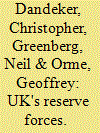| Srl | Item |
| 1 |
ID:
143284


|
|
|
|
|
| Summary/Abstract |
The growing trend toward the securitization of infectious disease has legitimated a role for national militaries in responding to public health crises. This apparent “militarization” of health has met with resistance from the health and security sectors alike, who argue that it risks politicizing health outcomes while also draining limited military resources. This article attempts to place such concerns within the broader historical context of military involvement in public health. With specific reference to pandemic influenza—a disease of great historical import and a current policy priority in the context of securitized global public health—this article details the pedigree of military involvement in fighting the disease and draws on the established record to demonstrate the role that militaries can play in improving public health outcomes. The article argues for an ongoing military role in the global fight against pandemic influenza, both in augmenting civil influenza programs and in improving their own preparation and response mechanisms for future pandemics.
|
|
|
|
|
|
|
|
|
|
|
|
|
|
|
|
| 2 |
ID:
104085


|
|
|
|
|
| Publication |
2011.
|
| Summary/Abstract |
This article focuses on how the role and structure of the UK's Reserve Forces have changed since their foundation before the First World War, with particular attention paid to the last two decades, during which time government has sought to make the Reserves more useable and relevant to post-Cold War military missions, including changing the legislative and administrative basis of their use. Since 9/11, Reserves have played an important role in the defense of the United Kingdom, particularly in operations in Afghanistan and Iraq, but the recent financial crisis has spurred further consideration of how best to structure and use this capability, which has been included as part of the recent Strategic Defence and Security Review (SDSR). The article analyses the current debate on whether the number of Reserve Forces should be cut or increased, and on how best to integrate their efforts with those of the Regular Forces. It also considers the evidence on the recent operational experience of Reserve Forces and its impact on a number of personnel issues, including recruitment, retention, and their health and well-being. The differences between the health and well-being outcomes for Reserve and Regular Forces are discussed and future lines of research enquiry highlighted, while the implications for the comparative analysis of Reserve Forces are also drawn out.
|
|
|
|
|
|
|
|
|
|
|
|
|
|
|
|